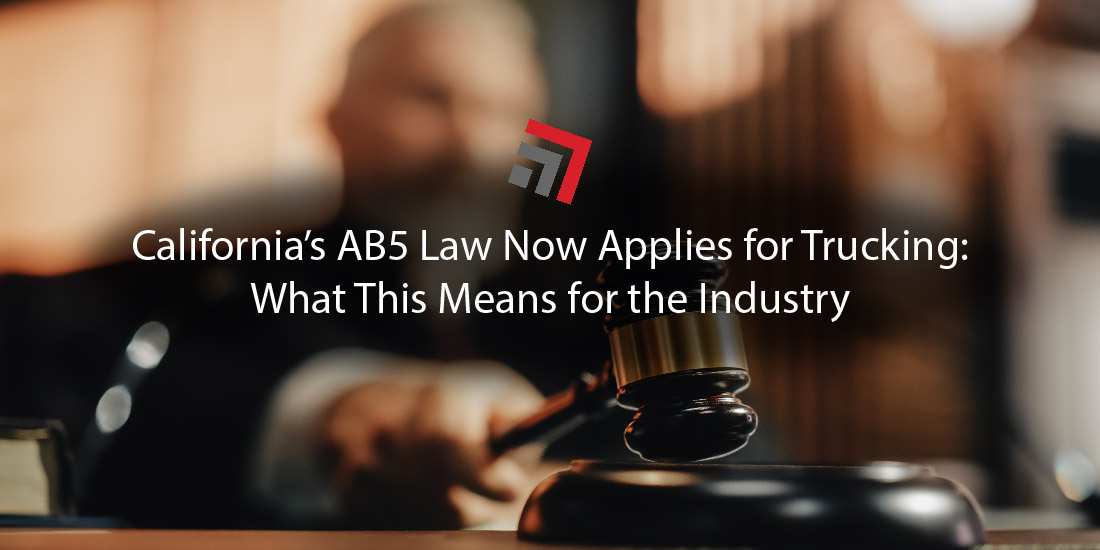The California trucking sector has battened its hatches in wake of the Golden State’s 2019 legislation set to take effect on their operations. Assembly Bill No.5, or better known as AB5, requires Californian employers to adapt to a new definition of employee that “includes, among other individuals, any individual who under the usual common law rules applicable in determining the employer-employee relationship, has the status of an employee”.
In other words, the AB5 law considers any person providing labor or services to an employer for payment is an employee rather than an independent contractor, unless the employer can prove otherwise. That said, this new precedent spells newfound challenges for the traditional independent owner model for trucking in the state of California.
The AB5 law, passed by state governor Gavin Newsom, went into effect January 1, 2020. According to HDT Trucking Info, the California Trucking Association (CTA) filed a lawsuit at that time citing a federal law, known as F4A, that forbid states from enacting laws relating to prices, routes, and services of motor carriers.
At that time, the courts agreed and granted an injunction prohibiting enforcement of AB5 onto the trucking industry. However, this forcefield could only hold up for so long. The U.S. Court of Appeals for the Ninth Circuit reversed on appeal and contested that the F4A law does not preempt labor laws. In this case, AB5.
The trucking industry is now at the whims of AB5.
The “ABC” Test
Etched into the AB5 law is a test to determine how a hired person for labor or services will be defined. Courtesy of Californian law firm Hacker Flynn and Associates, the “ABC” test will initially presume that any hired worker is an employee. The law firm states the responsibility to otherwise demonstrate “independent contract status of an employee” falls onto the employer.
To successfully prove to the state an employee is an independent contractor, an employer must demonstrate that the hired worker satisfies all three criteria of the “ABC” test.
- The person (hired worker) is free from the control and direction of the hiring entity (employer) in connection with the performance of the work, both under the contract for the performance of the work and in fact.
- The person performs work that is outside the usual course of the hiring entity’s business.
- The person is customarily engaged in an independently established trade, occupation, or business of the same nature as that involved in the work performed.
AB5 does exempt some lines of work from its regulation. Perhaps the most interesting exception are for brokers. However, independent owner operators of commercial trucks are not granted such amnesty from the law.
AB5’s Impacts on Trucking in California
With AB5 set to be enforced for Californian trucking, the industry will soon have to grapple with this new reality. However, stakeholders have not sat pat awaiting their fate.
In response to the reversal, CTA implored for the U.S. Supreme Court to hear out the organization’s appeal against the AB5 legislation and keep in place its safeguard from the law. Unfortunately for the CTA, its request to be heard out by the Court came to no avail. The Supreme Court declined review.
Courtesy of HDT Trucking Info, the CTA said in a statement, “Gasoline has been poured on the fire that is our ongoing supply chain crisis”.
The organization goes on to assert the direct and adverse impacts this new ruling will have on California’s roughly 70,000 owner-operators. “The impact of taking tens of thousands of truck drivers off the road will have devastating repercussions on an already fragile supply chain, increasing costs, and worsening runaway inflation,” the CTA continued.
CTA, along with other industry stakeholders, are disappointed that the Court did not recognize what they believe will cause “irrevocable” damage to interstate commerce. Specifically, they refer to the “ABC” test in the legislation and how it sets an impossible standard for motor carriers who use independent contractors (owner-operators) to meet.
In particular, the “B” criteria of the test—the hired worker performs work that is outside the usual course of the employer’s business—is seen as the proverbial nail in the coffin for trucking. Clearly, the labor and services owner-operators provide align swimmingly with the regular business operations of motor carriers.
That said, going off the language from the “ABC” test, motor carriers have little to no legal footing to successfully prove to the state an owner-operator is an independent contractor.
Final Thoughts
Going forward, it may appear futile to the trucking industry to work around this new precedent. However, courtesy of HDT Trucking Info there is an initial option for motor carriers.
Californian motor carriers could hire on owner-operators as employees. While doing so accounts for additional expenditures (benefits, full-time wages, etc.,), it does appear to be the most straightforward path when adapting to the AB5 landscape. However, it is worth noting many drivers have remaining desires to be independent contractors, according to transportation attorney Greg Feary who spoke with HDT Trucking Info. The liberties of owning their own trucks and business are certainly perks which may steer their interest away from full-time employment.
Please do not hesitate to contact one of our team members if you have any further questions on this topic or any others in domestic logistics.



Recent Comments